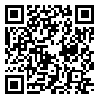Volume 2, Issue 2 (2014)
Health Educ Health Promot 2014, 2(2): 31-41 |
Back to browse issues page
Download citation:
BibTeX | RIS | EndNote | Medlars | ProCite | Reference Manager | RefWorks
Send citation to:



BibTeX | RIS | EndNote | Medlars | ProCite | Reference Manager | RefWorks
Send citation to:
Movahed M, Abbasi Shavazi M, Abbasi Shavazi M T, Alborzi S. Academic Education and Breast Self-Examination: A Comparative Study of Knowledge, Attitude and Practice of Medical and Non-Medical Female Students. Health Educ Health Promot 2014; 2 (2) :31-41
URL: http://hehp.modares.ac.ir/article-5-11068-en.html
URL: http://hehp.modares.ac.ir/article-5-11068-en.html
1- Associate Professor of Sociology, Department of Sociology, Faculty of social sciences, Shiraz University, Fars,Iran
2- PhD Candidate in Health Education , Department of Health Education, School of Health, Shahid Sadoughi University of Medical Sciences,Yazd, Iran
3- Assistant Professor of Sociology, Department of Sociology, School of social sciences, Shiraz University, Fars,Iran
4- M.Sc. in Demography, Department of Sociology, School of social sciences, Shiraz University, Fars, Iran
2- PhD Candidate in Health Education , Department of Health Education, School of Health, Shahid Sadoughi University of Medical Sciences,Yazd, Iran
3- Assistant Professor of Sociology, Department of Sociology, School of social sciences, Shiraz University, Fars,Iran
4- M.Sc. in Demography, Department of Sociology, School of social sciences, Shiraz University, Fars, Iran
Abstract: (5464 Views)
Aim: Breast cancer is the most common cancer among women worldwide. This comparative study was designed to investigate the knowledge, attitude, and practice of medical and non-medical female students concerning breast self-examination (BSE) in two different universities in Shiraz, Iran. It also examined the relationship between the students' knowledge, attitude, practice and type of academic education. Methods: A cross-sectional survey was conducted in Shiraz, Iran. 394 female students were selected using proportionate stratified random sampling (292 non-medical and 102 medical). A self-administered questionnaire was used for data collection, and the obtained data were analyzed descriptively. Findings: Medical students were more aware of BSE timing, stages of BSE performance and initiation age of BSE. Medical female students were also more likely to consider BSE as efficient, not difficult and time consuming, and to acknowledge that as a method for decreasing the probability of cancer. Regular BSE performance rate for both groups was very low and unsatisfactory (non-medical 2.1% and medical 2.9%). The results of t-test and Chi-square revealed significant differences across BSE knowledge, attitude and practice with type of academic education (medical or non-medical) (P=001). Conclusion: Based on the findings, the medical students were more knowledgeable and showed a better attitude and responded more positively than the non-medical student, but both groups showed low level of BSE practicing that is of a concern. The supportive role of universities in providing students with necessary information about breast cancer is suggested, and its prevention methods should be highlighted. Additionally, there is a need to a supportive environment which facilitates students’ access to qualified health care services.
Received: 2015/04/1 | Accepted: 2014/06/1 | Published: 2015/04/20
| Rights and permissions | |
 |
This work is licensed under a Creative Commons Attribution-NonCommercial 4.0 International License. |





